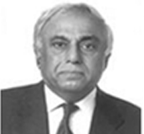 | Department of Economics |
| NEWS & MEDIA |
MEDIA
Will IMF learn?
|
The IMF needs to acknowledge that we have implemented almost all the
conditionalities on which it insisted when we signed the July 2019 agreement. This included
succumbing to adopting a market-driven exchange rate, implying a much larger depreciation than
the extent of our currency overvaluation — sparking inflation and raising cost of new
investment. |
It needs to be recognised by all, especially the IMF, that ordinary people are struggling and their patience is fast running out after the considerable loss in income caused by the earlier shutdown and now, by the slowdown in the economy as it limps back to life. Food inflation could take an ugly turn as people are dragged into rising poverty and those who had recently joined the ranks of the new middle class are now finding their earlier income gains dwindling fast and their small savings disappearing.
IMF-triggered riots over forcing countries to adopt economic reform measures that sharply increased unemployment and sent food prices rocketing, was a normal occurrence till recently. The IMF therefore quickly realised that the Covid-19 pandemic was taking a very heavy toll on developing countries and set up a Rapid Financing Instrument for them “without conditionalities” earlier this year. Under this facility, it approved $1.38 billion in assistance to Pakistan as “it has swiftly put in place measures to contain the impact of the shock and support economic activity. Crucially health spending and social support strengthened” (IMF press release).
But when it comes to the current Pakistan IMF programme, the IMF wears a completely different hat — as it had done in the old days!
Has the situation changed since earlier this year? Certainly not. The latest IMF Economic Outlook issued in October 2020 paints a gloomy picture and warns that globally “more than a million lives have been lost to Covid-19 since the start of the year and the toll continues to rise. Many more have suffered serious illness. Close to 90 million people are expected to fall into extreme poverty”. Its projections for Pakistan this year are just as gloomy, with a negative per capita growth rate, rising unemployment and inflation of over 10 per cent and a resulting rise in poverty.
Given these gloomy forecasts, what measures does the IMF continue to insist that Pakistan take if it is to release the next tranche of payments due to us? Raise energy prices, maintain a zero deficit on the primary fiscal balance, meet impossible revenue targets, not build up stocks of essential food items (including wheat), and give private traders a free hand to set prices (and make unfettered profits). It wants the government to give full autonomy to the State Bank when the need of the hour is a coordinated fiscal and monetary policy to overcome the uncertainty and unfolding pandemic.
Many of these conditions could be justified in normal time but they certainly cannot be done in these extraordinary Covid-19 circumstances. Indeed, the current situation dictates that the government may need to take further steps to protect real incomes of the poor as the current direct income support to the poor through Ehsaas and other programmes may not be enough. These may include raising direct subsidies on essential items especially wheat to tide over the current situation.
But these short-term measures need to be backed by a convincing medium-term plan that show how these will be financed without jeopardising the hard-earned macroeconomic stability achieved at considerable cost and hardship. Critically economic management needs considerable improvement and better coordination to avoid in future similar food inflation crisis.
The IMF must in turn move away from its stubborn insistence on pre-Covid 19 benchmarks and derail a programme that is being reasonably well implemented in very difficult circumstances. Indeed, it should reconsider its overall approach in Pakistan which has failed miserably over the last 30 years to spark sustained growth and is currently pushing it into a low-growth high inflation equilibrium triggered in part by its insistence on a market-driven exchange rate.
This article has been written by Dr. Rashid Amjad, Professor & Director, Graduate Institute of Development Studies, Lahore School of Economics and former Vice Chancellor of the Pakistan Institute of Development Economics
 People
People